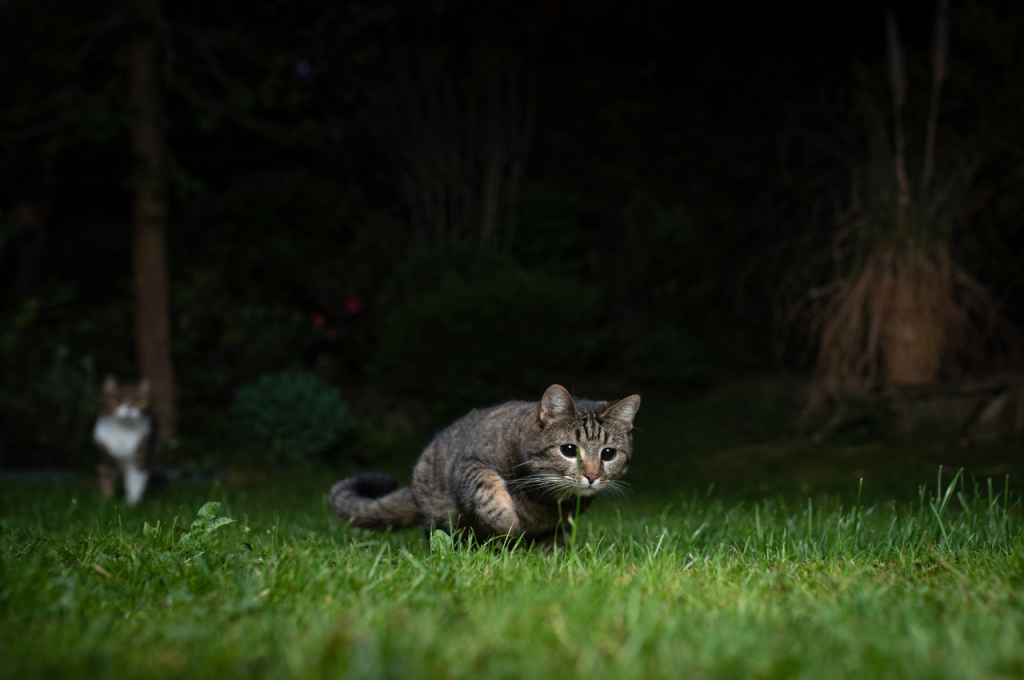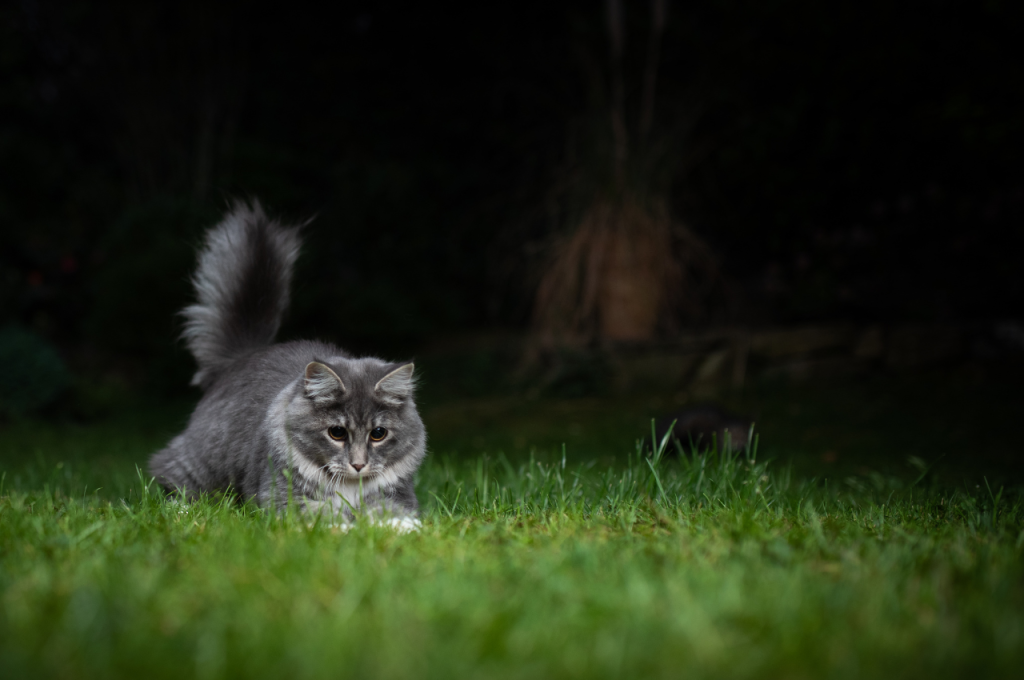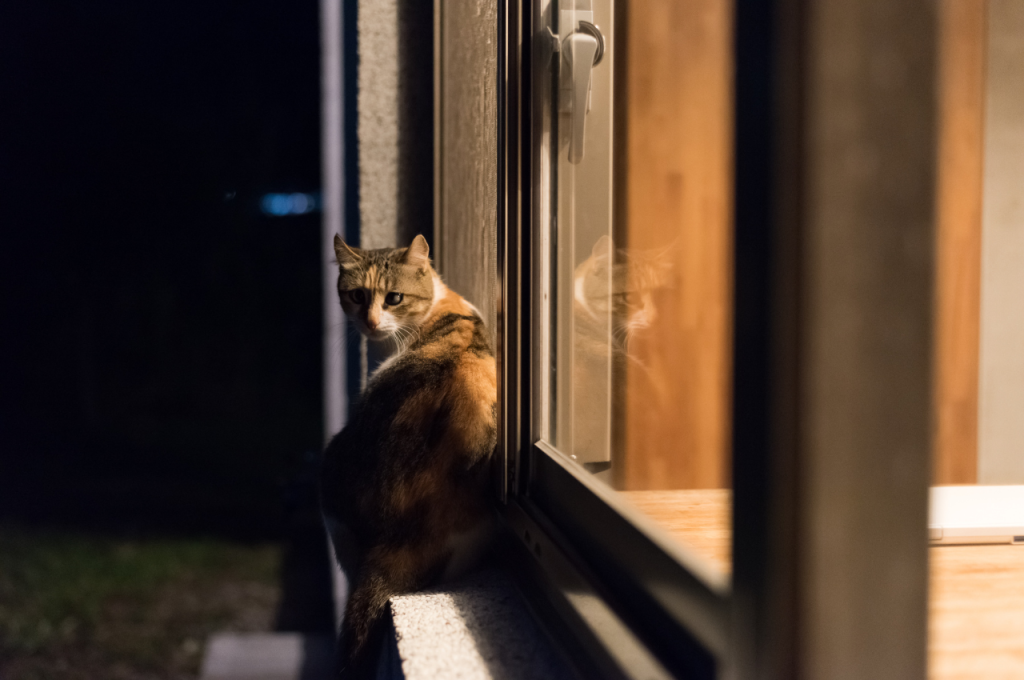If your cat becomes aggressive at night, it may be due to their natural hunting instincts and energy levels. This behavior is also more likely to occur in cats that are kept indoors without enough stimulation during the day.
Cats are known for their playful nature and nocturnal habits, which can sometimes lead to aggression during the night. This behavior may be caused by a variety of factors, including boredom, pent-up energy, or a lack of mental stimulation. Indoor cats are especially prone to becoming restless and aggressive at night, as they may not have had enough opportunities to exercise or play during the day.
Additionally, cats are natural hunters, and the quiet of the night may trigger their instincts to stalk and hunt prey. Understanding the reasons behind your cat’s nighttime aggression can help you find ways to prevent it and ensure a peaceful night’s sleep for both you and your feline friend.
Nighttime Feline Frenzy: An Introduction
Nighttime feline frenzy, often called the “cat crazies,” refers to a cat’s bursts of energy during the evening or late-night hours. This behavior is linked to their natural hunting instincts, as cats are crepuscular, meaning they are most active during dawn and dusk. Providing playtime and mental stimulation can help manage these nocturnal antics.

Cats’ Nocturnal Nature
Cats’ natural nocturnal behavior is deeply rooted in their evolutionary history. In the wild, cats are crepuscular animals, meaning they are most active during dawn and dusk. This behavior stems from their ancestors, who were hunters, and it has persisted in domestic cats today. As a result, cats often exhibit increased energy and heightened levels of activity during the nighttime hours.
First Signs Of Nighttime Aggression
Recognizing the first signs of nighttime aggression in your cat is crucial for addressing the issue effectively. Common indications of nighttime aggression include hissing, growling, and swatting at their owners or other pets. Moreover, excessive vocalization and restless pacing can also be signs that your cat is experiencing nighttime aggression. Understanding these initial signs can help pet owners take proactive measures to mitigate aggressive behavior and promote a more peaceful environment for their feline companions.
Historical Insights Into Cats’ Nightly Behaviors
Historical insights into cats’ nightly behaviors reveal intriguing aspects of their evolutionary background, domestication, and nocturnal habits. Understanding the historical context can provide valuable insights into why cats exhibit aggressive behavior at night.
Evolutionary Background
Cats are natural hunters and have evolved over thousands of years to be skilled nocturnal predators. Their ancestors relied on hunting at night to capture prey and avoid competition with other daytime predators.
Domestication and Nocturnal Habits
Despite domestication, cats have retained their nocturnal instincts. Their heightened senses and predatory nature are most active during the night, leading to behaviors such as increased activity, hunting, and territorial protection.
Common Triggers For Nighttime Aggression
Nighttime aggression in cats can be triggered by a variety of factors including lack of exercise, stress, boredom, and health issues. It’s important to identify the cause and provide appropriate solutions to help your cat feel more comfortable and less aggressive at night.
Lack Of Daytime Activity
Cats are naturally active animals, and they require physical and mental stimulation throughout the day. When they don’t get enough exercise or playtime during the day, they may become restless and agitated at night. This lack of daytime activity can contribute to nighttime aggression in cats. Some common factors that can lead to a lack of daytime activity include:
- Sedentary Lifestyle: Cats that spend most of their time indoors without access to outdoor exploration or interactive toys may become bored and restless.
- Lack of Playtime: If you don’t engage in regular play sessions with your cat, they may not be able to release their energy and may act out during the night.
- Loneliness: Cats are social animals, and if they spend long periods alone without companionship or interaction, they may become frustrated and exhibit aggressive behaviors at night.
To help address this issue, make sure to provide your cat with plenty of opportunities for exercise and mental stimulation during the day. This can include interactive toys, puzzle feeders, and play sessions. Additionally, consider providing a variety of scratching posts, perches, and hiding spots to keep your cat physically and mentally active.
Hormonal Influences
Hormonal influences can also play a role in a cat’s nighttime aggression. Certain hormonal factors can affect their behavior, particularly if they are not spayed or neutered. Unaltered cats may experience increased levels of aggression, especially during mating seasons. Here are some hormonal influences that can contribute to nighttime aggression:

- Mating Instincts: Unaltered cats may exhibit more territorial and aggressive behaviors at night due to their natural instinct to mate and establish dominance.
- Heat Cycles: Female cats in heat can display heightened aggression, restlessness, and vocalization, making them more prone to nighttime aggression.
- Testosterone Levels: Unneutered male cats may display more aggressive behaviors, including spraying and territorial aggression, especially during the breeding season.
To address hormonal influences, it is recommended to have your cat spayed or neutered. This can help reduce aggressive behaviors and provide a calmer and more contented cat. If your cat is already spayed or neutered and still exhibits nighttime aggression, it’s advisable to consult with a veterinarian to rule out any underlying health issues that may be contributing to their behavior. By understanding these common triggers for nighttime aggression in cats, you can take appropriate steps to address the issue and help create a more peaceful and harmonious environment for both you and your feline companion.
The Science Behind The Prowl
Understanding why your cat becomes aggressive at night is a key step in addressing this behavior. The Science Behind the Prowl delves into the biological and sensory factors that drive your feline friend to act out during the late hours.
Biological Clocks And Cats
Cats are crepuscular creatures, meaning they are most active during dawn and dusk. Their internal clocks, influenced by their wild ancestors, are geared towards hunting and exploration during these times. As a result, cats have a natural tendency to become more active and aggressive as night falls.
Sensory Stimulation at Night
At night, cats experience heightened sensory stimulation. Their acute hearing and night vision make them more sensitive to sounds and movements in their environment. This can trigger aggressive behavior as they respond to perceived threats or engage in hunting-like play. Additionally, the lack of daytime distractions can lead to pent-up energy, further contributing to aggression at night.
Personal Anecdotes: Cat Owners Share Their Stories
Cat owners share personal anecdotes about their feline friends’ nighttime aggression. Discover reasons why your cat may get aggressive after dark in heartwarming and relatable stories. Explore insights and tips from experienced cat owners to help manage and understand your cat’s behavior better.
Unexpected Night Attacks
One cat owner woke up to find their cat pouncing on their feet. Another owner shared how their cat suddenly turned aggressive at night. One cat parent was surprised by their cat’s nighttime hissing and growling.
Living With A Nocturnal Hunter
A cat owner described their nightly struggle with a cat wanting to play. One owner explained how their cat stalked them around the house at night. Another owner narrated their experience of their cat bringing them “gifts” in bed. In summary, cat owners’ stories reveal the challenges of dealing with nighttime aggression.
Professional Perspectives On Nighttime Aggression
Nighttime aggression in cats can stem from a variety of factors, including pent-up energy, hunting instincts, or territorial behavior. Cats are naturally more active at night, and this can lead to increased aggression during these hours. Providing ample playtime and mental stimulation during the day can help reduce nighttime aggression in cats.
Nighttime aggression in cats can be a concerning issue for pet owners. While some cats may become more active and playful at night, others may exhibit aggressive behavior. Understanding the underlying causes of this behavior is essential to address the issue effectively. In this section, we will explore the professional perspectives on nighttime aggression, including veterinary insights and behaviorist interventions.
Veterinary Insights
According to veterinary experts, nighttime aggression in cats can be caused by several factors. One of the most common causes is medical issues, such as pain or discomfort. Cats may become more irritable and aggressive when they are in pain, especially at night when they are trying to sleep. Other medical conditions, such as hyperthyroidism or neurological disorders, may also contribute to nighttime aggression.
Behaviorist Interventions
Behaviorists can help pet owners address nighttime aggression in cats by identifying the underlying causes of the behavior and developing a personalized treatment plan. One of the most effective interventions is environmental enrichment. Providing cats with toys, scratching posts, and other forms of stimulation can help reduce their aggression and increase their overall well-being. Another intervention that behaviorists may recommend is desensitization and counterconditioning. This involves gradually exposing the cat to stimuli that trigger their aggressive behavior and rewarding them for displaying calm behavior. Over time, the cat learns to associate the stimuli with positive experiences and may become less aggressive.

In conclusion, nighttime aggression in cats can be caused by a variety of factors, including medical issues and environmental factors. By seeking professional help and implementing the appropriate interventions, pet owners can help their cats overcome their aggression and improve their overall quality of life.
When To Seek Help: Understanding Aggression Levels
- If your cat displays uncharacteristic aggression, such as excessive hissing or biting, seek professional advice.
- A vet can assess your cat’s behavior and recommend appropriate steps to address the aggression.
Conclusion
Understanding why your cat gets aggressive at night can help you address and manage this behavior more effectively. By considering factors such as their natural instincts, territory, and stimulation, you can create a peaceful environment for your feline friend. Providing enriching activities, ensuring a consistent routine, and seeking professional advice when needed can all contribute to a harmonious coexistence with your nocturnal pet.
Remember, patience and understanding are key in resolving any aggression issues your cat may exhibit.
